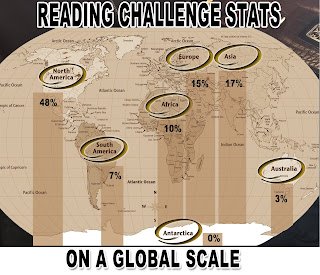A Short Story on Statistics
In general I view statistics as a numbers game, without instructions. It’s like we see (or hear) the numbers and percentage symbol, but don’t know nada about who, what, when, where, how…and sometimes why the data was collected. Everything is based on assumptions and generalities…such as how I started running my own numbers.
A few years ago I thought I might be reading more books written by males, than females. Turned out things were ‘Even Steven,’ which was a big sigh of relief, despite not quantifying qualifiers such as authors who use pseudonyms. I used general logic to determine the gender of authors.
Anyhow, and getting to the point of this story, while the caption I construed (assembled) is not too shabby, in terms of how diversified my reading habits are, it does not depict who I’m reading… or what topic… or when I read the book… or the specific location of the story…or how I collected this information …and mostly important, there is no explanation for why I’m sharing this news.
Welp, I just finished reading ‘Infidel’ by Ayaan Hirsi Ali, published 2007, which is after having read Mandela and Gandhi’s autobiographies, and many other ‘heavy’ non-fiction and memoirs coming out of that ‘vicinity’. Pretty much I assumed I was quite familiar with the social climate. Africa, from the West to the East, and the South, is old territory steeped in values, customs, beliefs and a rich culture. I know this. Many of us know this. And yet, was totally unprepared for the revelation that came out of Ayaan’s memoir (other thoughts here).
After reading ‘Infidel’, and in short succession reading ‘Kong Boys’ by Gerald Yeung, motivated me to take a harder look at my reading habits, on a global map. At a cursory glance, it appears impressive, (after all I’m talking about reading), but upon closer inspection there is much room for improvement. And while I won’t leave any spoilers as to the exact revelation that occurred to me, (perhaps you’ll read it, or have read it, and see/n it for yourself), but must reemphasize how much territory has to be covered before any ‘real’ logic can be applied to the assumptions that statistics suggest. The good thing is I'm finding the gems, and sharing them. All you have to do is read them.



I was always told people like numbers because "the numbers don't lie" me. I will stick to the words as they do change on a constant and that's the joy of reading.
ReplyDelete